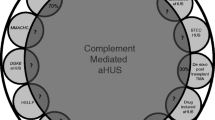Abstract
Complement factor H is a potent inhibitor of alternative pathway complement activation. The factor H gene, a member of the regulators of complement activation (RCA) gene cluster, encodes two plasma proteins, one 150 kilodaltons (kDa) and one 43 kDa. Homozygous deficiency of factor H results in low plasma levels of complement factor B and C3 and depletion of the terminal complement proteins C5-C9; heterozygotes may have reduced or normal levels of factor B, C3, and C5-C9. Although factor H deficiency is infrequently reported, it has been associated with a number of types of renal disease, the most common being atypical membranoproliferative glomerulonephritis and idiopathic (non-diarrhea-associated) hemolytic uremic syndrome (HUS). The molecular defects responsible for factor H deficiency have been described in only two cases; clearly more research is needed in this area. The possible role of factor H deficiency or dysfunction in the pathogenesis of HUS is discussed.
Similar content being viewed by others
Author information
Authors and Affiliations
Additional information
Received: 20 April 1999 / Revised: 28 December 1999 / Accepted: 3 January 2000
Rights and permissions
About this article
Cite this article
Ault, B. Factor H and the pathogenesis of renal diseases. Pediatr Nephrol 14, 1045–1053 (2000). https://doi.org/10.1007/s004670050069
Issue Date:
DOI: https://doi.org/10.1007/s004670050069




